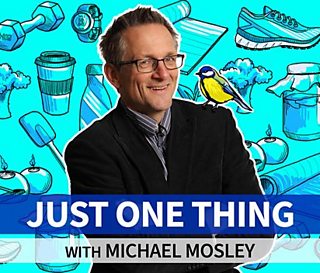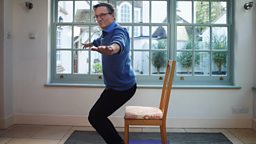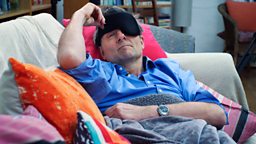Why you should take more breaks
The idea of taking a break from your work may seem counter-productive. But in fact, it’s one of the best things you can do on a busy day, with a wealth of benefits for your mind and body.
Where once you’d be spending much of the day moving about, many people now sit staring at computer screens. This more sedentary lifestyle comes at a cost: it affects your eye health, mood, focus & productivity. The good news is that simply building a few breaks into your day can help.
In his Radio 4 podcast Just One Thing, Michael Mosley reveals how taking regular breaks and allowing your mind to wander could enhance your mood, problem-solving and creativity!

Why you should take a break
Michael Mosley investigates the benefits of taking a break on your body and mind.
Put stress on pause
One of the earliest studies on micro-breaks emerged from research carried out in the late 1980s in the US. They set up a simulated working environment, a kind of phoney office where participants were asked to carry out a repetitive data entry task typical of a bog-standard working day. They found that brief microbreaks of up to about 3 minutes could lower their heart rate and improve the participants’ work accuracy. So just 3 minutes could create a calming effect!

They found that brief microbreaks of up to about 3 minutes could lower their heart rate.
Regular short breaks can also significantly reduce the stress hormone cortisol – and this is true even for constant high-pressure situations, such as performing surgery!
One study followed surgeons doing complex laparoscopic surgery. They found that those who were asked to put everything on hold and take a break for 5 minutes every half an hour had lower amounts of the stress hormone cortisol and made fewer mistakes than those who just had to power through. Now, we may not all be surgeons but taking regular breaks from any type of task can be important.
Treat your eyes
If you stare at close-distances for long periods of time, it can cause eye strain, and could potentially lead to worsening vision.
When you stare at close distances, the muscles in your eye contract. This changes the curvature of your eyes so you can focus on objects close to you. When you look at objects in the far distance, these muscles get a well-deserved break, they can relax and help you to rest your vision.
A recent study of 800 university students found that periodically refocusing on distant objects reduced symptoms of eye strain, watering, dry eyes and blurred vision. So, rather than keeping your eyes occupied by scrolling through your phone or reading, remember to look away, step away or even venture outside. And it’s not just your eyes that will benefit.
Let your mind wander
In the podcast, Professor Moshe Bar, a renowned cognitive neuroscientist from Tel Aviv, explains the benefits of allowing your mind to wander. “When you take a break, you don't want to load your mind with something else,” says Prof Bar. “Mind wandering plays an important function or functions in our mental and physical lives: it’s a power tool for creative thinking, for improving mood, for decision making; for mental resilience.”

When you have a lot on your mind it can affect your brain's patterns of thinking. If your mind is busy, it can make you less likely to form creative connections. Temporarily stepping away from work can act as a kind of mental release, bringing you benefits both for your mood and creativity.
Taking breaks can also be useful for a process called incubation, says Prof Bar. It will allow your brain some downtime to subconsciously process information. Research has also revealed that playful mind wandering can have a significant impact on your mood, helping clear your mind and combat rumination.
Every minute helps
Even a short break can help re-invigorate your goals and restore your focus. It really can help refill your resources and boost your vigilance, helping you perform better!
So, remember: even if the going gets tough, give your eyes and brain a deserved break – step away and go outside. Even just 10 minutes can have a big effect!
To find out more about the benefits of short breaks on your eye health, mood, problem solving and creativity, head over to the Just One Thing podcast on BBC Sounds.
















































